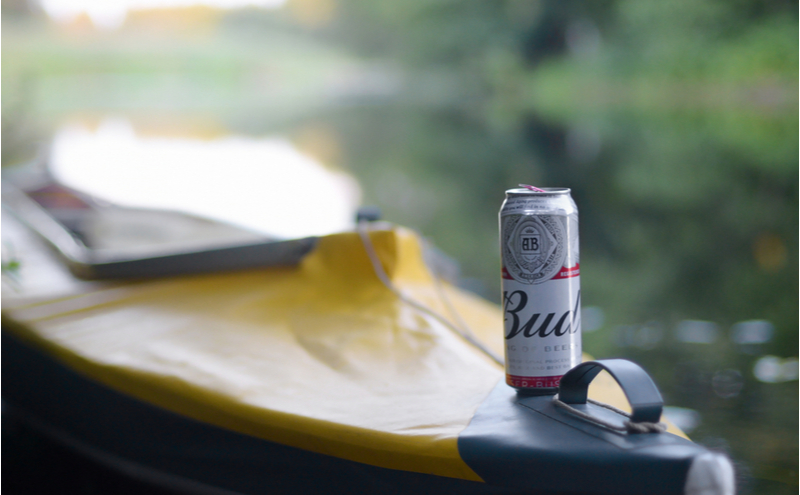We are all aware that it is against the law to drink and drive, but is there a law that actively forbids it? Or is it just common knowledge? Can you go to the river and have a couple of beers while fishing?
Alcohol is considered one of the leading causes of deadly accidents in boats. It has a higher fatality rate than being inexperienced, not paying attention to the route, or going too fast.
Can you get a DUI on a kayak? Here we learn everything about boating under the influence, the dangers of drinking and paddling, and how different countries handle the situation.
What Exactly is a DUI or BUI?
There’s a common misconception that DUI only applies to vehicles on the road, such as cars and motorcycles, but that’s not true.
“DUI” means Driving Under the Influence. This is sometimes used interchangeably with “BUI”, which stands for Boating Under the Influence.
Most countries, and probably yours, have BUI. So yes, It is highly likely that you can get yourself in trouble if you’re drinking on a boat. But can you get BUI while paddling a kayak?
Does BUI Apply on Kayaks?
If we look into the technicalities, driving under the influence presides over any vehicle with a motor. A boat is a motorized vehicle, which means that you can get busted for drinking on a boat.
Kayaks are man-powered vessels, so they don’t have an engine, however, some countries allow officers to conduct BAC (Blood Alcohol Content) checks on non-motorized boats. This is carried out because the added efforts in paddling a kayak would leave you exhausted, and highly susceptible to drowning.
The Dangers of Drinking and Paddling
If you don’t care about the fine and possibly getting some jail time, there are plenty of good reasons to avoid getting light-headed on a boat.
Most people are aware of how alcohol slows down rational thinking, impairs awareness of surroundings, and affects common sense There’s also a good chance of getting too drunk that you lose consciousness.
When someone starts drinking, they will need to keep paddling almost all the time, to counter the tide and maintain their route. This is where the first problem arises.
This is important because alcohol tires your body faster, leaving you more prone to exhaustion. You will need to stay concentrated to avoid getting into any collision.
It’s also worth mentioning that alcohol can leave you out of balance, which puts you at risk of overturning your kayak at any time. Not to mention, alcohol makes your body temperature lower, which can increase your chances of getting hypothermia in cold weather.
Yes, it can be argued that for an experienced paddler a beer or two wouldn’t pose a threat to their safety. We’re not saying that drinking on a boat will certainly kill you, but the risk is significantly amplified.
You’re also not looking at the legal regulations concerning how much alcohol lands you a BUI, which could mean that even a couple of beers would place you at risk of failing a breathalyzer test.
Laws and Regulations Around the World
Every country deals with drinking and boating differently, although the fundamental rule remains the same. You should know that if you are about to get a breathalyzer test, your blood alcohol content should remain below 0.80% (or in some states, 0.1%) in order to pass.
The United States
The United States has different regulations according to state laws. There is a comprehensive list of boating laws. A law can be subject to different interpretations based on the situation, and a lot of officers asked to make their decisions on a case-by-case rationale.
A lot of kayakers will say that they don’t get subjected to strict laws because they usually don’t venture deep into the water to get stopped by the coast police.
Other people say that getting a BUI can be as easy as drinking and jumping on an inflatable in the water. Most laws refer to boats or any watercraft as a vessel. This includes anything that can be used as a method of transportation across the water.
Canada
Also with their own list of province-specific laws, this time, much more strict. It probably isn’t ideal for you to drink and go kayaking in Canada.
Canadian law openly identifies a kayak as a vessel, which is subjected to BUI just like any other motorized vehicle. If your BAC comes 0.80 mg or higher, you are considered under the influence and could be handed a $1000 fine or up to several months in jail.
UK
Things are different in the United Kingdom because they apply alcohol legislation on any vessel that exceeds 23 feet. This does mean that you can technically get drunk while kayaking, but this doesn’t you’re perfectly safe.
Get too drunk and you can be arrested for public intoxication or peace disruption, which would have severe consequences.
Australia
Maintaining a strong stance against kayaking and drinking, Australian law requires all kayakers to follow the same laws of any water vessel. This means that they are not tolerant of anyone drinking on a kayak.
New Zeland
Similar to Australia, New Zealand’s law asks kayakers to follow all boating laws. It is very evident that New Zealand can prosecute you if caught drunk while operating any form of water vessel. Section 65 of the Maritime Transport forbids anyone from kayaking under intoxication.
In Conclusion
It is apparent that drinking and kayaking is not a very smart move. What might start as an innocent and fun activity may quickly take a turn for the worse.
It is imperative that you check your local precinct and confirm that you’re allowed to drink on your kayak. Please don’t underestimate the dangers of nature, follow the law and your local regulations and take care.

